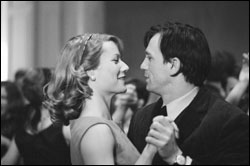When Sylvia Plath put her head in the oven in 1963, envious fellow suicidal poet Anne Sexton called it “a good career move.” It did make her immortal: This fall, witness the flawed yet compelling movie Sylvia (which opens Friday, Oct. 31, at the Harvard Exit); the Plath play Edge by Paul Alexander, whose Ted Hughes-bashing Plath bio Rough Magic was just reissued; and the landmark Plath/Hughes bio Her Husband (Viking, $25.95) by 1961 UW grad and Theodore Roethke student Diane Middlebrook, who shared her research with Kate Moses, author of the Plath novel Wintering, new in paperback.
Everybody’s reading about Sylvia Plath. “But which Sylvia Plath?” asked Middlebrook on a recent visit to Seattle. Take your pick. In the play, she’s the feminist martyred by Ted’s patriarchal wandering shlong. For Ted’s sister, Olwyn, Sylvia was a psycho harpy Ted fled to save his life. (“It was her or me,” he muttered to friends after the suicide.) Middlebrook herself emphasizes the poet’s many masks: “There was also the intense and really bitchy Sylvia Plath, the Sylvia Plath who had the joy of life, was very interested in her children, wrote like a demon, was very sociablethere are incessant dinner parties in the journals.” Sylvia Plath as Martha Stewart? “She was Martha Stewart, absolutely she was!” confirms Middlebrook. This posthumous feminist icon was no feminist, and it was motherhood that triggered her gift.
The movie tries to be kind to both Ted and Sylvia, sketching her contradictions while stressing her vulnerable side. It shows how literature bound them, how his magnetism attracted women like lint, and how her banshee jealousy helped drive him away. Sylvia really did say of her bosomy rival Assia Wevill (Amira Casar), “I conjured her.” Gwyneth Paltrow radiantly conjures Sylvia, especially in the early scenes, when she spots Ted (craggy Daniel Craig) at a Cambridge party, engineers their erotic collision, outdoes his friends in competitive Shakespeare recitation, then enchants him by chanting Chaucer to a herd of cows. Paltrow’s intelligent, lovely face even resembles Plath’s.
Yet so much is missing! Paltrow’s voice and physical mien capture the glamour-girl and sensitive-sufferer sides of Plath, but fail to convey her blowtorch intensity. Most movies try to sex up real stories; Sylvia unsexes an incredibly lurid tale of passion, jealousy, and betrayal. (Plath famously drew streaming blood on their first kiss.) Both Ted and Sylvia attained greatness by unleashing their instinctive inner demons, but Sylvia fatally soothes them. Paltrow’s rages are too tame: She spends the movie dwindling into genteel, saintly sorrow, when the real woman was a holy terror.
YET AS DIRECTOR Christine Jeffs explained during her Seattle promo tour, the softening of the melodrama was partly budgetary. Of Plath’s true, very Hollywood attempted suicide by car wreck, she says, “We didn’t have time in the schedule to do a car crash, really.” But it was also an artistic decision, consistent with her wish to honor Plath and steer clear of the sordid. “We tried to get at a more poetic way of getting across the emotion that she’s come to the end of the road.”
But where is it written that poetry shouldn’t be sordidor that poets shouldn’t live reckless, self-destructive lives? Again, Middlebrook reminds us, Plath was the product of a wild period. “They were mad about poetry, really believed in it as a vocation. That used to be true around here.” One poet who made the early-’60s Seattle scene was the Hughes’ close friend W.S. Merwin, and Roethke was arguably the crucial influence on Plath. “It was a poetry place. Very glam. Drunkenness was expected of everyone.” Yet Middlebrook feels the film goes awry after the early, drunk-on-verse scenes, missing Plath’s contradictions by drawing a straight line to suicide.
Thus, Sylvia shows Plath unsociably spoiling a party with a jealous scene, implying her behavior was part of the madness that killed her. Olwyn Hughes has popularized this view, too (see Anne Stevenson’s 1989 Bitter Fame, for which she was the primary source). But Middlebrook says the madness only recurred very close to the suicide. “Plath was not mentally ill when she knew Olwyn. Somebody in a fit of rage is primitively regressed, but not necessarily crazy. Sylvia deprives Plath’s rages of both their scariness and their fiercely unreasonable sanity.
IT ALSO FAILS to do full justice to Ted, blandly sanctifying him into a cipher. Though Craig is sexy and poetical enough, he’s short, while Hughes was huge. Sylvia also cops out on his skirt chasing. It’s vague about what went down in the love triangle with Assia. The last time Ted saw Sylvia, he told her they’d be back together by summer. “Hughes thought she would understand his need for indulging himself in this infatuation and that basically he and she were solid,” says Middlebrook. “He just had to have this fling. A very bohemian attitude. He had social cluelessness and a great sense of entitlement.”
That’s tough to dramatize within romantic film conventions. And you’d have to read Hughes’ newly published, 1,332-page Collected Poemscomplete with two dozen poems about Sylvia and Assia, who also killed herself, plus her daughter to grasp his nuanced feelings about his two lost loves. Also, Hughes wasn’t a hypocrite: his deep, mystical belief in inner wilderness was consistent and had a cracked integrity.
Maybe a new round of Plathiana will emerge in 20 years, when Hughes’ archives are unsealed at Emory University. Middleton thinks they may contain Plath’s 1960-62 diaries, which Ted claimed (inconsistently) to have destroyed or misplaced. The box may also contain Plath’s lost novel, which she called a “potboiler” about a betraying philanderer, with characters based on Assia and Assia’s cuckolded husband, apparently influenced by Jules and Jim and Last Year at Marienbad. Assia wanted Ted to destroy it; maybe he didn’t. It sounds like it would make a hell of a movie.








